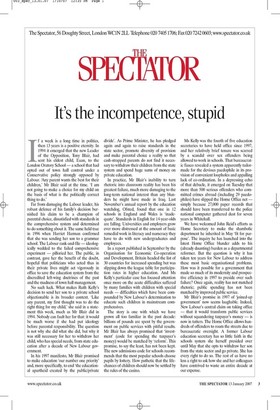It's the incompetence, stupid
1 f a week is a long time in politics, then 13 years is a positive eternity. In 1994 it emerged that the new Leader of the Opposition, Tony Blair, had sent his eldest child, Euan, to the London Oratory School — a school that had opted out of town hall control under a Conservative policy strongly opposed by Labour. Any parent wants the best for their children,' Mr Blair said at the time. 'I am not going to make a choice for my child on the basis of what is the politically correct thing to do.'
Far from damaging the Labour leader, his robust defence of his family's decision burnished his claim to be a champion of parental choice, dissatisfied with standards in the comprehensive system and determined to do something about it. The same held true in 1996 when Harriet Harman confirmed that she was sending her son to a grammar school. The Labour rank-and-file — ideologically wedded to the failed comprehensive experiment — pilloried her. The public, in contrast, gave her the benefit of the doubt, hopeful that politicians who acted thus in their private lives might act vigorously in office to save the education system from the discredited left-wing doctrines of the past and the madness of town hall management.
No such luck. What makes Ruth Kelly's decision to send her son to a private school objectionable is its broader context. 'Like any parent, my first thought was to do the right thing for my child,' she said in a statement this week, much as Mr Blair did in 1994. Nobody can fault her for that: it would be much worse if she had put ideology before parental responsibility. The question is not why she did what she did, but why it was still necessary for her to withdraw her child, who has special needs, from state education after a decade of New Labour government.
In his 1997 manifesto, Mr Blair promised to make education 'our number one priority' and, more specifically, to end `the educational apartheid created by the public/private divide'. As Prime Minister, he has pledged again and again to raise standards in the state sector, promote diversity of provision and make parental choice a reality so that cash-strapped parents do not find it necessary to withdraw their children from the state system and spend huge sums of money on private education.
In practice, Mr Blair's inability to turn rhetoric into classroom reality has been his greatest failure, much more damaging to the long-term national interest than any blunders he might have made in Iraq. Last November's annual report by the education watchdog, Ofsted, found that one in 12 schools in England and Wales is 'inadequate'. Standards in English for 14-year-olds are falling. Universities and employers grow ever more distressed at the amount of basic remedial work in literacy and numeracy they have to do with new undergraduates and employees.
In a report published in September by the Organisation for Economic Co-operation and Development, Britain headed the list of 30 countries for increased spending but was slipping down the league table for participation rates in higher education. And Ms Kelly's particular case has focused attention once more on the acute difficulties suffered by many families with children with special needs — difficulties which have been compounded by New Labour's determination to educate such children in mainstream comprehensives.
The story is one with which we have grown all too familiar in the past decade: billions of pounds are spent by the government on public services with pitiful results. Mr Blair has always promised that 'investment' (code for spending the taxpayer's money) would be matched by 'reform'. This promise, to say the least, has not been kept. The new admissions code for schools recommends that the most popular schools choose pupils by lottery. How pathetic that the lifechances of children should now be settled by the rules of the casino.
Ms Kelly was the fourth of five education secretaries to have held office since 1997, and her relatively brief tenure was scarred by a scandal over sex offenders being allowed to work in schools. That bureaucratic fiasco revealed a system apparently tailormade for the devious paedophile in its provision of convenient loopholes and appalling lack of co-ordination. In a depressing echo of that debacle, it emerged on Tuesday that more than 500 serious offenders who committed crimes abroad (including 29 paedophiles) have slipped the Home Office net — simply because 27,000 paper records that should have been transferred to the police national computer gathered dust for seven years in Whitehall.
We have welcomed John Reid's efforts as Home Secretary to make the shambolic department he inherited in May 'fit for purpose'. The inquiry he has launched into the latest Home Office blunder adds to his (already daunting) burden as a departmental reformer. But the question is why it has taken ten years for New Labour to address these most basic organisational problems. How was it possible for a government that made so much of its modernity and prospective efficiency in 1997 to preside over such failure? Once again, reality has not matched rhetoric; public spending has not been matched by improved public service.
Mr Blair's promise in 1997 of loined-up government' now seems laughable. Indeed, New Labour's central claim on taking office — that it would transform public services without squandering taxpayer's money — is now in tatters. The Home Office allows hundreds of offenders to roam the streets due to bureaucratic oversight. A former Labour education secretary has so little faith in the schools system she herself presided over until May that she opts to withdraw her son from the state sector and go private. She has every right to do so. The rest of us have no less a right to ask how she and her colleagues have contrived to waste an entire decade at our expense.






















































 Previous page
Previous page